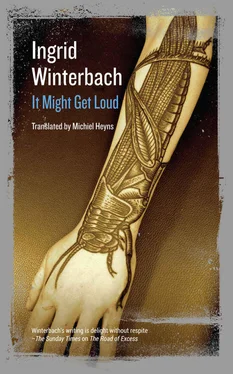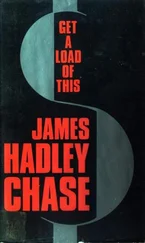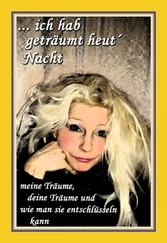In the late afternoon she drives to the other side of town and stops in front of the house in which she, her ex-husband, the sculptor Andreas Volschenk, and their asthmatic child, Benjy, used to live. The hedge has been replaced by a wall, the gate by a wooden door.
Maria stands on tiptoe and peers over the wall at her former life. There is the large studio that Andreas had built in the back garden, there is the stoep where Donny peed in the pot plant, shortly before inflicting irremediable physical injury upon his little bride in her red Pep Stores outfit. (Bashed to death with a rock.) The trees in the garden have grown — the rhus and the leopard tree and the fever tree, but also the trees on the pavement. The fish pond has been filled in; where there used to be lawn, there is now neat paving. Easier to maintain. How the desperate poor went through the motions of raking the leaves for a pittance. How they knocked at the front door in homeless despair or reckless ecstasy to confront her with their demands. (Andreas was always at work in his studio, it was Maria who had to open the door, it was she who had to mediate the external world.)
The shutters are closed, the house seems sedate, reserved. Their former neighbours’ house has been flattened, an apartment block has been erected there. They had a dog with a blue tongue, a husky. A powerful breed, used in Arctic regions to pull sleds. What was the poor dog to do in the gruelling heat of the long summer months in the Western Cape, and in autumn, with its leaf-litter — dreaming of its Eskimo antecedents and of snow? What were they thinkin g, those misguided neighbours, to keep such a dog? Maria has forgotten its name.
She remembers how Margaretha Stoffels, her domestic ‘help’, would prop up her bicycle against the garden gate. In the sitting room Margaretha said, one year and fourteen days after that his mother eventually died. On her death bed I promised I would bury him. Margaretha had a knack for the conceptual, and draped the springbok hide on a cushion in the centre of the sofa. He left and that with my own sister, she said. But for three of those years we lived together. Margaretha Stoffels was sixty-one years old and some afternoons after work she would jump on her bicycle and go to visit a friend in Gordons Bay. She did not dust books. That she had to be taught. Margaretha was wonderfully balanced in her judgements and assessments; she was never racked with diffidence or doubt. She always knew from which direction she could expect disaster. She refused to let her circumstances defeat her, no internal conflict drained her energies, otherwise she could never have cycled from the Strand to Stellenbosch and back. For two years after her first husband’s death she didn’t know what day it was, she recounted. Then she asks her mother, then her mother says, but it’s Sunday today. On Monday, again, she didn’t know it was Monday. Then she has to ask again. Then she asks, Mammie, what day is it?
It took Margaretha Stoffels two hours and seven minutes to cycle from the Strand to Stellenbosch in the morning. She was grateful every morning when she woke up and saw that it wasn’t raining. A fine day, on her bike, and on her way. All went well, as long as she didn’t stop pedalling or get off her bike. Willem had left home for Gordons Bay at quarter past six that morning. Margaretha wore jeans, open high-heeled sandals, a spencer and a white jersey. As soon as she arrived at the house, she would take off the spencer and jersey and hang them out to freshen up, and put on a housecoat. Around her neck she wore a pendant with a blue stone. She washed the hand laundry in the bathtub. She hung it on the line and looked up at the blue sky overhead. What were the signs? When she’d done working, Margaretha got onto her bicycle and cycled back to the Strand.
And Joeta. Maria thought, every winter, this winter she and her companion will snuff it. This winter is the last they’ll lie on the slopes. This winter is the last they’ll lie on their backs, their eyeballs frozen, gazing at the drifts of mist trailing past. But after every winter he and Joeta appear in front of Maria’s door again. Joeta with blood under her nose. She fell. So she says. They are hungry. Maria gives them food on the front stoep. Joeta collapses against the wall and crams the food into her mouth. She is restless and she keens. She keens, she says she wants. She wants what? She wants somewhere warm to sleep? She wants her human needs fulfilled? She plucks at her clothes. The bolus of chewed rice, tomato, blood and saliva is visible in her mouth. Somewhat behind her, somewhat in the shade, also collapsed against the wall, her companion is eating wordlessly. He does, though, later chastise Joeta for her diverse indiscretions, such as her over-familiarity with whites.
It was as if the undeserving poor resented the white walls of their house as a grievous affront to their sensibilities. They used the walls for support. They could often not support themselves on their own legs at the door. Open the front door and arouse them from their profound slumber, then they startle awake for a moment and let go of the walls. The very oldest left grey fingerprints. The younger ones a sweaty, oily impression, like the image on the Turin shroud. The adolescent vagrants wrote on the walls with burnt matches poes and kak .
*
The next morning she pays a visit to the cemetery where her parents lie buried. With some difficulty she locates their double grave. It’s dead quiet in the cemetery. The pine trees in the area have been destroyed in a forest fire. The surroundings look razed. The cemetery has expanded, but the contours still seem familiar to her.
So here she stands. Her arms dangle limply by her sides. Dry of eye and sounding like brass. An empty vessel, a rattling pod. The sky above her is wide and cloudless. So utterly without portent. Everything — the sky, the light, the silence, the trees, the red earth, the stones, everything so bereft of augury or omen.
She has no desire to prostrate herself on the graves. No desire to press her ear against the cold granite tombstones. No desire to moisten some soil with her spit and daub her face with it; to rend her garments, scatter sand and pebbles and twigs and leaves on her head, and to ululate on the tomb housing the mouldering bones of her parents.
Bereft of desire she stands here, in the sparse shade of a little tree close to the graves. Later she sits down on the edge of the nearer, her father’s grave. For a long time she sits like that. She thinks of the oracle bones from the Shang era. The ancestral spirits were invoked and then the oracle’s prediction was carved on these bones. What does she want to know: Against what shall I wage battle and how shall I defend myself?
*
On the second day of her visit to the town Maria Volschenk thinks she sees Joeta and her consort at a distance on a pavement in the vicinity of the Strand Road. But it can surely not be. Joeta could hardly have survived for all these years, neither she nor her consort. They must have perished of exposure long ago; somebody must by now have bashed their heads in — if needs be he hers or she his (inseparable though they were), as Donny did with his little bride.
For a second consecutive day she pays a visit to the graves of her parents. Is a vigil by the grave of a deceased parent not the same as consulting an oracle? She doesn’t think so. As on the previous day it is dead quiet in the cemetery this morning. It is the end of February and hot .
She is sitting on the edge of her father’s grave, in the sparse shade of the tree. She is sitting here in the hope of making contact with something inside herself. A sense of loss perhaps? Remorse? Longing? But she can’t escape the feeling that it’s better for them to lie here than to be above-ground. In any case after what happened to Sofie.
Читать дальше












